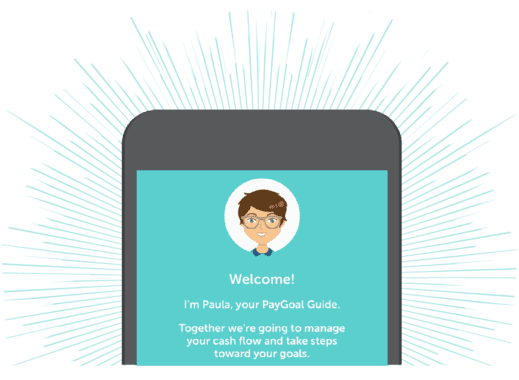Profile in Medium by the Financial Solutions Lab
February 22, 2016
PayGoal by Neighborhood Trust is a non-profit member of the first class of the Financial Solutions Lab, which now seeks Year Two applicants who are creating solutions that can make more Americans financially healthy. Non-profits and startups are invited to apply now at https://www.f6s.com/finlab.
Behavioral economists have long studied the phenomenon of choice architecture — the notion that the way we make decisions is largely influenced by how choices are presented to us. Changing the way people make decisions — say about how and when they spend their money — means changing the way those choices are presented to them.
Neighborhood Trust Financial Partners, a New York-based non-profit organization, has been following this concept in developing its app and workplace financial tool, PayGoal, which includes a built-in virtual financial planner who helps users make smarter decisions about how their paychecks are spent each month.
Of this year’s nine FinLab participants, PayGoal is the only non-profit. “I always like to encourage people to see the non-profit status as an indicator that we are mission-driven,” says Justine Zinkin, CEO of Neighborhood Trust. Still, being part of FinLab’s first class, which also includes eight FinTech startups, helps hold PayGoal to the same benchmark of quality as its for-profit counterparts. “We want to be held to the same standards — that this is about scale and changing the marketplace,” says Zinkin.
As New York City’s leading provider of financial counseling, Neighborhood Trust has offered training and products to help people better manage their finances for years. With an annual income of $18,000, around $14,000 in debt and a subprime credit score of around 590, the average Neighborhood Trust client is often working to build a better credit score, pay off debts and learn how to better manage their money. Rather than wasting more than $40,000 over the course of their careers converting paychecks into cash, Neighborhood Trust hopes to teach low-income clients to engage in healthier financial behavior.
Paycheck as Pathway to Financial Health
In 2011, the nonprofit began launched its “Employer Solution” workplace wellness practice. They began to partner directly with employers to help reach people at the start of their cash flow journey — when they first get their paycheck — and to leverage the processes and systems workers are already connected to in order to encourage better choices and behaviors. Neighborhood Trust found that while employees often had the best intentions to spend their paychecks wisely, they didn’t have the technology to make that happen. “We were helping people manage their money, but were seeing that the systems around us were fairly primitive,” says Zinkin.
That’s when Neighborhood Trust began to wonder: How can we transform the payroll process to make it easier for people to put their paychecks to better use? In 2014, in the hopes of creating a way to reach people using technology and choice architecture, the non-profit brought in tech entrepreneur Eric Cantor to serve as a vice president of product development for PayGoal.
The app works by tracking users’ income and outstanding bills, making sure they spend the right amount of income at the right time depending on their financial needs. “We are seeing a lot of people we believe could get by with the right money moved around at the right time,” says Cantor.
Much of this goes back to the concept of choice architecture. “People are behaving in a certain way because of the influence of the application in front of them,” says Zinkin. The challenge PayGoal was tasked with: “How do you design a product that nudges people toward the outcome that’s better for them?”
Meet Paula

Open the PayGoal beta app and the first thing you see is Paula, greeting you with her wide smile, oversized glasses and neat close-cropped hair. But Paula is more than a cute cartoon avatar. “People have a lot of affinity for their personal advisor,” says Cantor. “Paula was a persona created to mirror as many of those traits as possible.”
The average PayGoal user earns between $1,500 to $3,000 a month. Rather than helping those users create a budget like most money management tools do, Paula helps them take a more proactive approach, automatically allocating certain portions of an incoming paycheck to cover outstanding bills in a way that makes the most of the money available.
Efraim Vasquez, who works as a chef in New York City, is a PayGoal user. “My financial situation is rocky right now. I have student loans and I’m trying to rebuild my credit,” says Vasquez, whose work schedule is often erratic. “Sometimes I work so much, I don’t focus on the financial stuff.”
After signing up as one of PayGoal’s beta users, Vasquez began receiving alerts when his bills were due. By giving PayGoal access to his bank account, he deferred to the app to tell him how much he should pay toward each bill and even complete the payments for him. “It was like I had someone to watch my back when I was somewhere else not thinking straight,” says Vasquez. “It made me pay more attention to my financial situation.”
The Financial Solutions Lab is now seeking applicants to its second class — winners receive $250,000 in capital as well as unparalleled access to partners and insights that can help their solutions scale.
Link to article: medium.com/@FinancialSolutionsLab/revolutionizing-how-employees-manage-their-money-yeah-there-s-a-non-profit-for-that-3ff80444531b#.wjo0tnk67

Follow Us